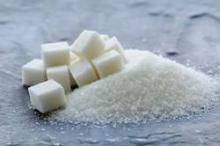Excess intake of sugar in the diet significantly raises the risk of cardiovascular mortality, independently of other risk factors, according to an analysis of National Health and Nutrition Examination Surveys data published online Feb. 3 in JAMA Internal Medicine.
In an analysis of sugar intake using serial representative samples from the U.S. adult population, people who consumed 17%-21% of their daily calories from sugar – the second-highest category of sugar consumption – showed a nearly 40% higher risk of CVD death than did those who consumed less than 10% of their daily calories from sugar, as is recommended by the World Health Organization. People in the highest category of sugar consumption, who consumed 21% or more of daily calories from sugar, doubled their risk of CVD death, said Quanhe Yang, Ph.D., of the division for heart disease and stroke prevention, Centers for Disease Control and Prevention, Atlanta, and associates.
To put these figures into context, most adults in the United States (72%) consumed 10% or more of their daily calories in the form of sugar during the study period. And at least one-tenth of the population consumed 25% or more of their daily calories in that form, nearly tripling their risk of CVD death, the investigators noted.
Dr. Yang and colleagues examined time trends in sugar consumption using data from the National Health and Nutrition Examination Surveys (NHANES) in 1988-1994 (11,733 participants), 1999-2004 (8,786 participants), and 2005-2010 (10,628 participants). They defined "added sugar" as all sugars used in processed or prepared foods such as sugar-sweetened drinks, grain-based desserts, dairy desserts, candy, processed cereals, and yeast breads, but not naturally occurring sugars such as those present in fruits and fruit juices.
Over time, the mean percentage of calories from added sugar in the adult diet rose from 15.7% to 16.8% and then decreased to 14.9%.
The major sources of added sugar in the diet were sugar-sweetened drinks, which accounted for nearly three times as many calories as the next-highest source, grain-based desserts.
Compared with the lowest quintile of sugar consumption, the risk for cardiovascular death increased exponentially with increasing percentage of calories from added sugar, even after the data were adjusted to account for numerous potentially confounding factors such as blood pressure, body mass index, and cholesterol level, the investigators said (JAMA Intern. Med. 2014 Feb. 3 [doi:10.1001/jamainternmed.2013.13563]).
This increase in risk of CVD death was consistent across all but one subgroup of the population by age, sex, race/ethnicity, educational status, physical activity level, and BMI. The exception was among non-Hispanic black adults.
In addition to the WHO, several other organizations have issued recommendations regarding sugar intake, and there is a great deal of variance in their advice. The Institute of Medicine recommends that no more than 25% of daily calories be derived from added sugar, while the American Heart Association suggests that total calories from sugar should be less than 100/day for women and less than 150/day for most men.
The results of this study suggest that participants who consumed 10%-25% of their calories as sugar – a level below that of the IOM recommendations but above that of the WHO and AHA recommendations – still had a 30% higher risk of CVD mortality than did those who consumed fewer calories as sugar. Those who consumed at least 25% of their calories nearly tripled their risk (adjusted hazard ratio, 2.75)
It is not yet known how sugar raises CVD mortality. However, there are several biologically plausible pathways, as sugar is known to raise blood pressure, increase hepatic fat, raise triglyceride levels, adversely affect cholesterol profiles, and increase circulating inflammatory markers, Dr. Yang and associates said.
No financial conflicts of interest were reported.


